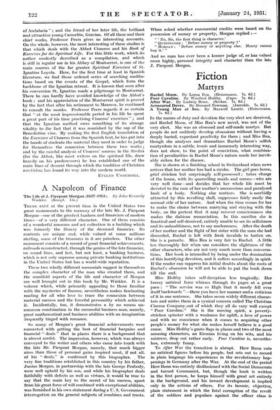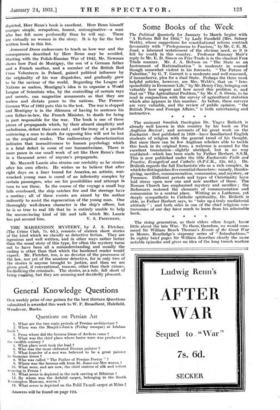Fiction
Martyrs
IN the names of duty and devotion the very elect are deceived, and Rachel Moon, of Miss Rea's new novel, was not of the very elect. She was an obsessed and self-made martyr. But people do not suddenly- develop obsessions without having a
deeply buried, expectant proclivity for them ; and Miss Rea, though she analyses and dramatizes Rachel Moon's selfish martyrdom in a subtle, ironic and immensely interesting way, does not show, to the point of conviction, what combina-. tion of peculiarities in Rachel Moon's nature made her inevit-
ably sicken for the disease.
She is shown at a finishing school in Switzerland when news
arrives that her mother has had a stroke. The girl goes home, grief stricken but surprisingly self-possessed ; takes charge,
of the house, with its quarrelling maids and nurses—who ate very well done—and decides that her whole life must be devoted to the care of her mother's unconscious and paralysed husk of a body. Nothing else matters. She is morbidly attracted by this revolting shell, suppresses fairly easily the normal side of her nature. And when the time comes for het to make the choice between marrying and staying with the body, on the pretext that it may recover consciousness she makes the dubious renunciation. In this sacrifice she is, fanatical and self-deceived, entirely unable to see its selfishness and its unhealthiness, not to say uncleanness. After the death of her mother and the flight of her sister with the man she had discarded, Rachel is left with fresh invalids to batten on. She is a parasite. Miss Rea is very fair to Rachel. A little too thoroughly fair when one considers the slightness of the other characters, who are not very much more than conversa- tions. Her book is intensified by being under the domination of this horrifying devotion, and it suffers accordingly in spirit.
If the reader can suppress his initial doubts about the roots of Rachel's obsession he will not be able to put the book down till the end.
Miss Holtby takes self-deception less tragically. Her breezy satirical farce whizzes through its pages at a great pace : " The service was so High that it nearly fell over itself backwards "—there you have her manner and a criticism of it in one sentence. She takes seven widely different charac- ters and unites them in a cynical concern called The Christian Cinema Company, out of which they all do very well except " Poor Caroline." She is the moving spirit, a poverty- stricken spinster with a weakness for uplift, a love of power and with no conscience when it comes to acquiring other people's money for what she makes herself believe is a good cause. Miss Holtby's gusto flags in places and two of the most amusing characters, an Etonian living on his wits, and his
mistress, drop out rather early. Poor Caroline is, neverthe- less, extremely funny.
To After War the transition is abrupt. Herr Renn cuts no satirical figures before his people, but sets out to record in plain language his experiences in the revolutionary hap- penings in Germany after the War. At the end of the period Herr Renn was entirely disillusioned with the Social Democrats and turned Communist, but, though the book is written in the first person, he keeps himself with great art entirely in the background, and his inward development is implied only in the actions of others. For its laconic, objective, plain statement in which the fatal corruption of the revolt of the soldiers and populace against • the officer class is depicted, Herr Renn's book is excellent. Herr Renn himself emerges simple, scrupulous, honest, unimaginative—a man who has felt more profoundly than he will say. There are virtually no women in the story. It is by far the best written book in this list.
Armoured Doves endeavours to teach us how war and the consequences described by Herr Renn may be avoided. Starting with the Polish-Russian War of 1942, Mr. Newman shows how Paul de Montigny, the son of a German father and a French mother, and a member of the British Red Cross Volunteers in Poland, gained political influence by the originality of his war dispatches, and gradually grew to be the saviour of the world. Regarding the League of Nations as useless, Montigny's idea is to organize a World League of Scientists who, by the controlling of certain rays and secrets, can magnetize armaments so that they are useless and dictate peace to the nations. The Franco- German War of 1962 puts this to the test. The war is stopped and Montigny is in the dilemma of having to sentence his own father-in-law, the French Minister, to death for being in part responsible for the war. The book is one of those pieces of propaganda which, by their absurd simplicity and melodrama, defeat their own end ; and the irony of a pacifist sentencing a man to death for opposing him will not be lost on the sceptical reader. The rudimentary characterization indicates that insensitiveness to human psychology which is a fatal defect in some of our humanitarians. There is more peace in one small work of art like Herr Renn's than in a thousand acres of anyone's propaganda.
Mr. Maxwell Laurie also strains our credulity as he strains after his own effects. He wishes us to believe that after eight days on a liner bound for America, an artistic, war- wracked young man is cured of an inferiority complex by certain passengers, who see his possibilities and attempt in turn to use them. In the course of the voyage a small boy falls overboard, the ship catches fire and the steerage have a mutiny ; all of these events are aimed by the author indirectly to assist the regeneration of the young man. One thoroughly well-drawn character is the ship's officer, but he is so true to real life that he is entirely unable to help the unconvincing kind of life and talk which Mr. Laurie







































 Previous page
Previous page